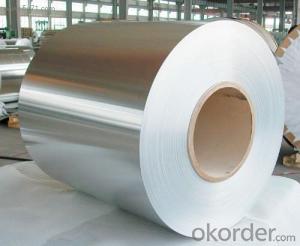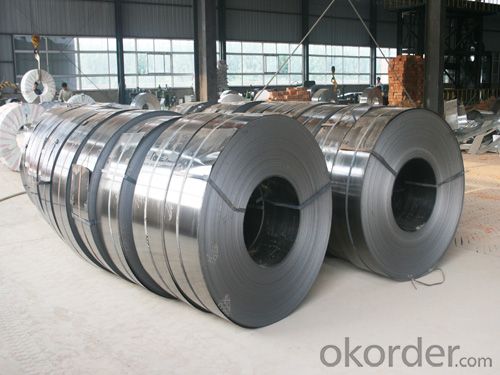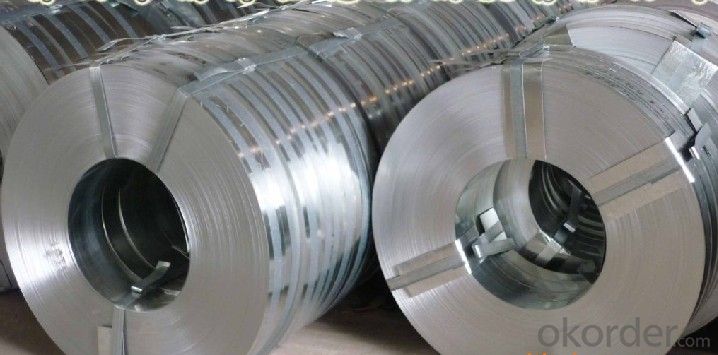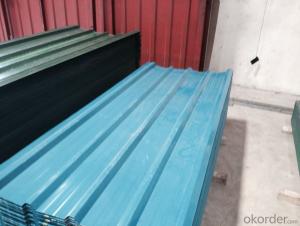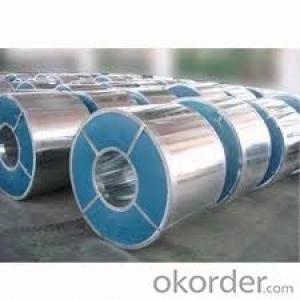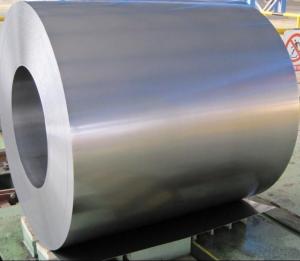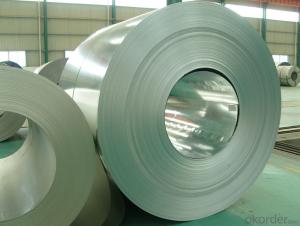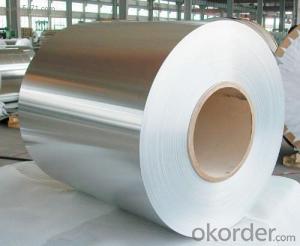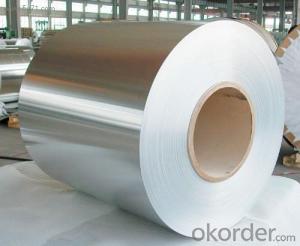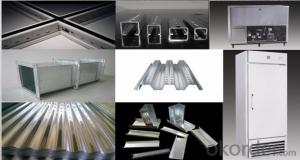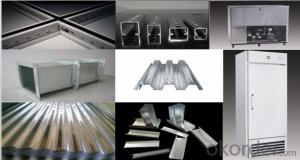Hot-dip Zinc Coating Steel Building Roof Walls -Smooth and Flat Surface
- Loading Port:
- China main port
- Payment Terms:
- TT OR LC
- Min Order Qty:
- 50 m.t.
- Supply Capability:
- 10000 m.t./month
OKorder Service Pledge
OKorder Financial Service
You Might Also Like
Hot-dip Zinc Coating Steel Building Roof Walls -Smooth and Flat Surface
1.Structure of Hot-Dip Galvanized Steel Sheet Description:
Hot-dip galvanized steel coils are available with a pure zinc coating through the hot-dip galvanizing process. It offers the economy, strength and formability of steel combined with the corrosion resistance of zinc. It is especially useful for countless outdoor and industrial applications. Production of cold formed corrugated sheets and profiles for roofing, cladding, decking, tiles, sandwich walls, rainwater protective systems, air conditioning duct as well as electrical appliances and engineering.
2.Main Features of the Hot-Dip Galvanized Steel Sheet:
• Smooth and flat surface
• Workability, durability
• High strength
• Good formability
• Good visual effect
3.Hot-Dip Galvanized Steel Sheet Images
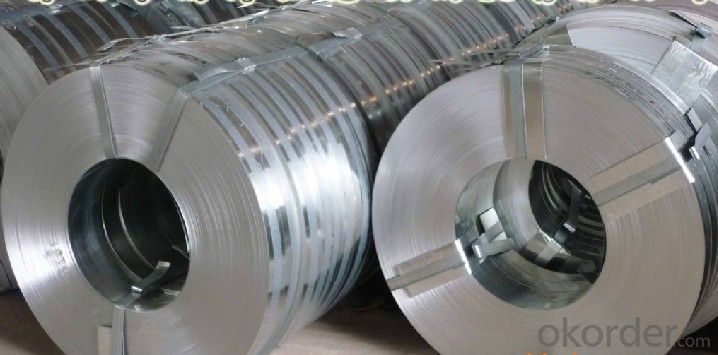
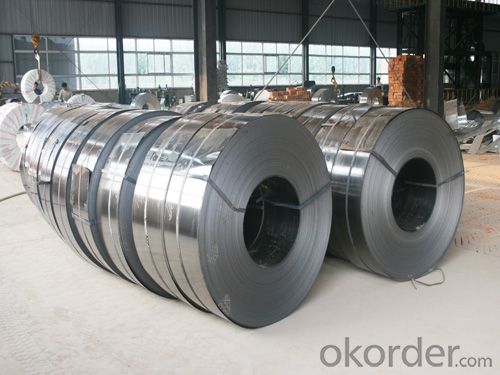
4.Hot-Dip Galvanized Steel Sheet Specification
Standard: ASTM, JIS,EN
Grade: CS, DX51D+Z,SGCC, SS 230~550,S220GD+Z~S550GD+Z, SGC340~SGC570
Thickness: 0.18mm~5mm
Width: max 2000mm
Coil weight:3-12 MT
Coil ID:508/610mm
Surface structure: zero spangle, regular spangle or minimum spangle
Surface treatment: Chromate treatment, Oiled/dry, skinpassed/non-skinpassed
Packing: Standard seaworthy export package
5.FAQ of Hot-Dip Galvanized Steel Sheet
1.How to guarantee the quality of the products?
We have established the international advanced quality management system,every link from raw material to final product we have strict quality test;We resolutely put an end to unqualified products flowing into the market.
2. How long can we receive the product after purchase?
Usually within thirty working days after receiving buyer’s advance payment or LC. We will arrange the factory manufacturing as soon as possible. The cargo readiness usually takes 15-30 days, but the shipment will depend on the vessel situation.
- Q: Want to construct a patio cover approx. 20 feet long. Only want to use a 6x6 or 8x8 post at each end. What size steel i-beam would I have to use to carry the load???
- u can buy a laminated wood beam that would hold the weight and look better but will be taller than a metal beam i dont know much about building with metal just thought id give u another idea i know other ways but would not look good on a patio good luck
- Q: What are the different methods of transporting steel coils?
- There are several methods of transporting steel coils, including using flatbed trucks, railcars, and ocean vessels. Flatbed trucks are commonly used for short distances and local deliveries, while railcars are utilized for longer distances and intermodal transportation. For international shipments, steel coils are typically transported on ocean vessels, either in containers or as breakbulk cargo. The choice of method depends on factors such as distance, destination, and cost-effectiveness.
- Q: How are steel coils classified based on their thickness?
- Steel coils are classified based on their thickness using a gauge system, where the higher the gauge number, the thinner the coil.
- Q: How are steel coils used in the production of automotive stampings?
- Steel coils are an essential component in the production of automotive stampings. These coils are typically made from high-quality steel and are cut into specific widths and lengths to meet the requirements of automotive manufacturers. The first step in using steel coils for automotive stampings is to uncoil the steel. This is done using a machine called a decoiler, which unwinds the coil and feeds it into the stamping machine. The decoiler ensures a continuous supply of steel for the stamping process. Once the steel coil is unwound, it is fed into the stamping machine, which is equipped with a die that shapes the steel into the desired automotive component. The die is designed to create precise and complex shapes, such as car body panels, doors, fenders, or structural components. The stamping machine applies force to the steel coil, pressing it against the die and forming it into the desired shape. The high-quality steel used in the coils ensures that the stamped components have the necessary strength and durability required for automotive applications. After the stamping process, the stamped components are inspected for quality and precision. Any imperfections or defects are identified and corrected before the components are sent for further processing, such as painting, welding, or assembly. Overall, steel coils play a crucial role in the production of automotive stampings. They provide a continuous supply of high-quality steel, which is shaped into precise and durable automotive components. The use of steel coils ensures that the automotive stampings meet the required standards for strength, durability, and precision.
- Q: Can steel coils be coated with chemical-resistant materials?
- Yes, steel coils can be coated with chemical-resistant materials. The use of chemical-resistant coatings helps protect the steel coils from corrosion and damage caused by exposure to various chemicals, acids, or solvents. These coatings create a barrier that prevents the chemicals from reaching the steel surface and ensure the durability and longevity of the coils in harsh chemical environments.
- Q: Theirs this two handed chinese sword on amazon with a forged combat steel blade and i was wandering if it means combat steel in the same sense that tempered carbon steel can be used?
- Combat steel? No such thing... Combat steel is a commercial product... not a true type of steel, since there is no ASTM grade of combat steel... And carbon steel is a WHOLE list of different types of steel, whether it's tempered or not... The company does not provide what steel specifications it has other than combat steel... So my best guess is that it's an alloy of 1095 or 301 spring tempered... both are resilient to snapping and fatigue, and common in modern swords... however, they do not hold an edge very well and are prone to rusting...
- Q: i mean the properties include the elasticity, impact load and ductility. am doing assignment about the perfect material that should be possessed by spring and i found alloy steel is the perfect and am confused whether stainless steel is the same with alloy steel ?
- Alloy Steel Vs Stainless Steel
- Q: How are steel coils used in the production of metal ductwork?
- Steel coils are an essential component in the production of metal ductwork. These coils, typically made from high-quality steel, serve as the primary raw material for manufacturing ductwork. The process begins with the unwinding of the steel coil, which is then cut into specific lengths according to the required dimensions of the ductwork. These lengths are then shaped into the desired form using specialized machinery, such as roll formers or bending machines. The steel coils provide the necessary strength and durability to the ductwork, ensuring that it can withstand the pressure and environmental conditions it may encounter in its operational life. The coil's composition also allows for easy fabrication and customization, enabling manufacturers to create ductwork of various shapes and sizes to meet specific project requirements. Furthermore, the inherent properties of steel, such as its resistance to corrosion and fire, make it an ideal material for ductwork. Steel coils can be coated with protective layers, such as galvanized or stainless steel finishes, to enhance their longevity and performance. This added protection ensures that the ductwork remains intact and functional even in harsh environments or in the presence of corrosive substances. In summary, steel coils play a crucial role in the production of metal ductwork by providing the necessary raw material for fabrication. Their strength, durability, and customization capabilities make steel coils an indispensable component in the manufacturing process, resulting in reliable and long-lasting ductwork systems.
- Q: How is steel different than iron?How many different kinds of steel are there?What type is the strongest?Which type is the weakest?
- Steel has a higher carbon content than iron. The remaining questions are covered by a whole chapter in any materials text. In short, there are many classes of steels and steel alloys each with its own properties and heat treatments to yield a specific strength and hardness value.
- Q: How are steel coils used in the production of household appliances?
- Steel coils are used in the production of household appliances as they serve as the primary material for manufacturing various components such as the outer body, frame, and internal structures. These coils are formed into different shapes and sizes, allowing for the creation of durable and robust appliances. The steel coils provide strength, stability, and resistance to wear and tear, ensuring the longevity and reliability of the appliances.
Send your message to us
Hot-dip Zinc Coating Steel Building Roof Walls -Smooth and Flat Surface
- Loading Port:
- China main port
- Payment Terms:
- TT OR LC
- Min Order Qty:
- 50 m.t.
- Supply Capability:
- 10000 m.t./month
OKorder Service Pledge
OKorder Financial Service
Similar products
Hot products
Hot Searches
Related keywords
